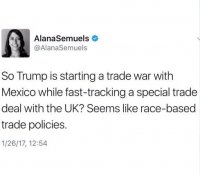
Alana writes for The Atlantic ....

The Future of Housing Segregation Under Trump
Most at risk is a rule, released in July of 2015, requiring communities to “affirmatively further fair housing”—a provision of the Fair Housing Act of 1968 that had long been mostly ignored. Under the 2015 rule, cities are required to assess whether housing in their communities is racially segregated, and then release the results of that assessment every three to five years. Cities are encouraged, through financial incentives, to set desegregation goals, establish new low-income housing in integrated neighborhoods, and track their progress on those goals.
The rule was widely panned by many conservatives, who saw it as government overreach. “The explicit purpose of HUD’s new rule is to empower federal bureaucrats to dictate where a community’s low-income residents will live,” Republican Senator Mike Lee, of Utah, said on the Senate floor. Trump disliked the rule too, according to The Daily Caller. In a meeting last summer with Rob Astorino, a politician in Westchester, New York, who is battling the construction of affordable housing in his county, Trump reportedly said that he thought the rule took away the rights of local communities. Astorino later told reporters that Trump said that the rule “would not continue under the Trump administration.”
HUD has been adding staff to administer the rule and monitor communities’ process of evaluating their housing options. The easiest way for Trump to ensure the rule isn’t enforced would be to simply not provide funding or resources to hire the staff to make sure cities are carrying out these assessments, Silverman said. Trump could also rescind the rule entirely, though that would be a more radical approach. “I assume it would be more of a withering process, where the agency would be denied resources for things that the administration doesn’t prioritize,” Silverman said. This happened in the Environmental Protection Agency after Reagan took office, he said, when the new administration simply didn’t provide the EPA with enough resources to do its regulatory work.
Last edited:
